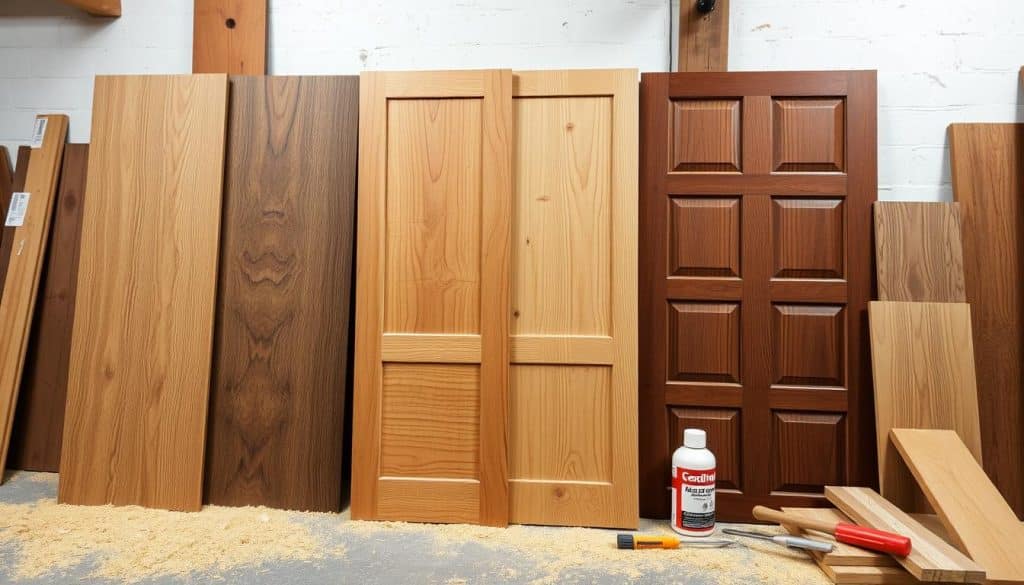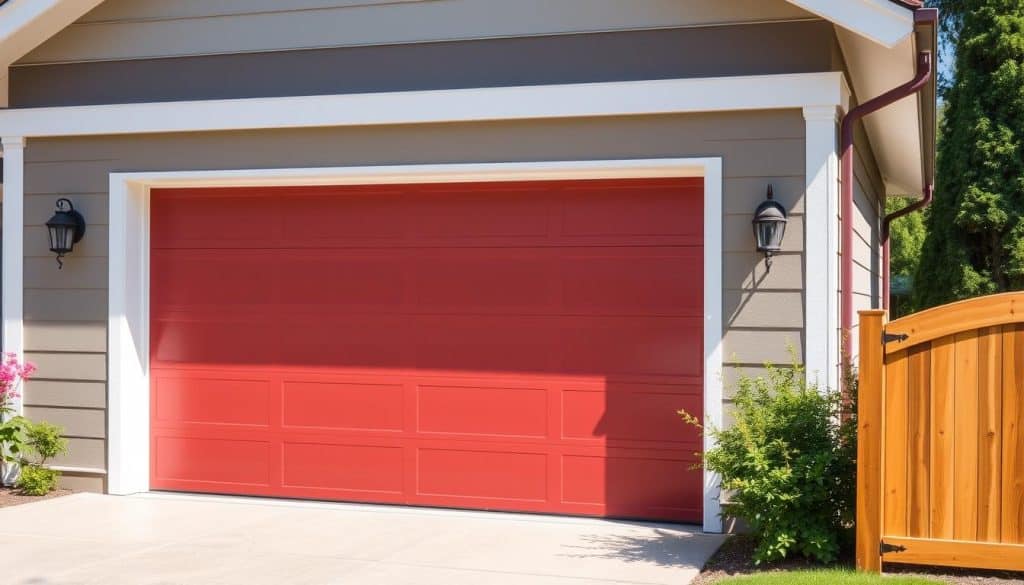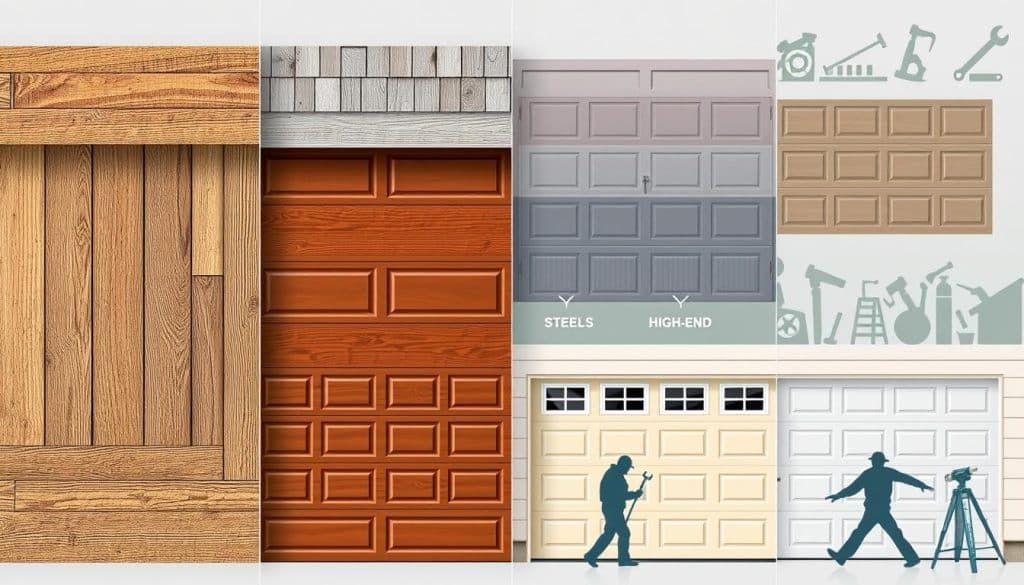Ever thought about What Materials Are Best for Garage Doors? or how your garage door’s material affects your home’s look and energy costs? Picking the right material is key. It affects durability, upkeep, and more. With many choices, we wonder: what’s the best material for garage doors?
This choice depends on your budget, local weather, and personal taste. Let’s dive into each material’s unique traits. This will help us find the top garage door materials today.
Key Takeaways
- Steel garage doors are the most popular choice among homeowners for their affordability and low maintenance.
- Wooden doors offer aesthetic appeal but require regular maintenance to prevent issues like rot.
- Aluminum doors are lightweight and rust-resistant, with various customization options.
- Insulation options are available for many materials, aiding in energy efficiency.
- Composite doors combine multiple benefits, including low maintenance and moisture resistance.
Introduction to Garage Door Materials
Choosing the right garage door materials is key for your home’s look and function. The materials you pick can change how well your home saves energy, lasts long, and looks. We need to look at different garage door material options based on what we need and like.
The Importance of Choosing the Right Material
When picking from ideal garage door materials, think about the long-term effects. Style, upkeep, and how long it lasts can make us happy with our choice. For example, steel doors are very durable and can last 20 years or more with the right care.
Wood doors, on the other hand, are beautiful but cost 30-50% more than steel. This shows how important it is to think about cost and looks.
Factors to Consider When Selecting Materials
Many things matter when choosing garage door materials. We should think about how well it insulates and how much it weighs. For example, aluminum doors are about 50% lighter than steel, which means less wear on the opener.
Fiberglass doors are also very resistant to damage, with a dent rate under 5%. Choosing the right materials means finding a balance between usefulness and looks.
Steel Garage Doors
Steel garage doors are a top pick for many homeowners. They are strong, durable, and affordable. They also come in various styles, making them appealing to many.
Benefits of Steel
Steel doors can handle harsh weather and heavy use well. They last from 15 to 30 years, depending on care and weather. This makes them a great choice for homes and businesses.
Insulated steel doors can save up to 20% on heating and cooling costs. They also offer 30% more security than wood doors. This makes them a solid choice for those seeking safety and efficiency.
Design and Customization Options
Modern steel garage doors come in many styles, including wood-like finishes. You can pick from wood-grain patterns or smooth looks. This lets us match our doors to our home’s design while enjoying steel’s durability.
Maintenance Requirements
Steel doors are easy to maintain. Just clean them with soap and water to keep them looking good. This is much less work than caring for natural wood, which can rot or warp.
Choosing steel doors means less upkeep, saving up to 50% of maintenance time. This makes them a hassle-free choice for years.
Aluminum Garage Doors
Aluminum is a top pick for garage doors. It’s light and strong, making it perfect for those who want both looks and durability. Let’s dive into why aluminum is a favorite among homeowners.
Advantages of Aluminum
Aluminum doors don’t rust, which is great for places with lots of moisture. They stay looking good for a long time with little upkeep. With proper care, they can last many years, looking great.
Lightweight and Durable
Aluminum doors are light and easy to move. This is great for homes with lots of traffic. They also look like expensive wood, saving you money.
Aluminum is both strong and stylish. It’s a top pick for many.
Cost Considerations
Aluminum is affordable compared to other materials. It’s cheaper than high-end wood but is durable and stylish. This makes it a smart choice for those watching their budget.

Wood Garage Doors
Wood garage doors are loved for their classic look and charm. They fit well with many home styles, making them a favorite choice. This option is known for its beauty and the chance to customize it.
Classic Aesthetics of Wood
Wood is a top pick for garage doors because it looks great with both old and new homes. It brings a warm, inviting feel to any place. We can choose from many finishes and stains to match our home’s look and improve its curb appeal.
Types of Wood Used
There are different types of wood for garage doors, each with its own perks. Cedar and redwood are good choices because they resist rot and bugs well. They’re perfect for places with a lot of rain or humidity.
Composite wood garage doors are another option. They mix wood fibers with synthetic materials. This makes them strong and looks like real wood.
Maintenance and Durability
Wood garage doors can last 15 to 30 years with the right care. They need more attention than materials like aluminum or fiberglass. To keep them looking good, we should reseal and repaint them every few years.
Not taking care of them can cause damage like cracking and rotting. Knowing how to maintain them helps us see the value of choosing wood. It’s a long-term investment that balances cost with beauty and value.
Fiberglass Garage Doors
Fiberglass is a modern choice for garage doors, known for its durability and good looks. It’s important to consider the pros and cons of different materials when picking the right one for your home.
Overview of Fiberglass Features
Fiberglass garage doors are great because they don’t dent or rust easily. They’re also light, making it easier to open them by hand or with an opener. This can make your garage door last longer.
These doors can look like many other materials, fitting well with different home styles.
Insulation Properties
Fiberglass doors are very good at keeping heat in and cold out. They have an R-value of 2.9 to 3.8 per inch, which means less air gets through. This can lower your heating and cooling bills, saving you money.
Pros and Cons
Fiberglass doors are easy to care for, needing only occasional cleaning. Wood doors need regular staining or painting, and metal doors need rust protection often. Fiberglass doors cost between $800 and $2,700, with installation adding $500 to $1,500.
When comparing costs, think about what you need now and in the future. This will help you choose the best garage door for your home.
Vinyl Garage Doors
Vinyl garage doors are a popular and affordable choice. They are known for their cost-effectiveness and quality. This makes them a favorite among homeowners looking to save money without sacrificing style.
Benefits of Vinyl Materials
Vinyl garage doors are easy to maintain. A simple wash with soap and water keeps them looking new. Unlike wood doors, which need regular staining or painting, vinyl doors stay beautiful with minimal effort.
They are also durable, resisting dents, rust, and fading. This makes them a great choice for families or homes in storm-prone areas.
Weather Resistance
Vinyl garage doors are excellent in extreme weather. They help keep garage temperatures stable. This also means they can save on heating and cooling costs.
In humid areas, like Columbia County, vinyl doors are a big plus. They resist moisture, keeping your garage dry and comfortable.
Aesthetic Options
Vinyl doors may not have as many color options as some materials. But they can look like wood, giving you many style choices. You can pick from various designs and colors to match your home’s look.
This flexibility makes vinyl garage doors a top pick for many homeowners. They offer a great balance of beauty and practicality.

Insulated vs. Non-Insulated Doors
Choosing between insulated and non-insulated doors depends on your needs. Insulated doors have more layers, making them stronger and better at keeping energy in. They help keep your home’s temperature steady, which is great if you have a garage attached to your house.
Non-insulated doors are made of a single sheet of steel. They offer basic protection but don’t keep temperatures steady as well as insulated doors do.
Understanding Insulation Requirements
Insulation in garage doors is key to keeping your home’s temperature right. Insulated doors have higher R-values, which means they keep heat in better. For example, polystyrene can have R-values from 5.9 to 12.9, and polyurethane can go up to 20.4.
This means insulated doors can make your home 10 to 20 degrees warmer in winter and cooler in summer. This makes your home more comfortable.
Energy Efficiency Benefits
Insulated doors save you money on your energy bills. They also block out more noise, which is good if you live near a busy street. Even though they cost about $1,500 on average, they can save you money in the long run.
Non-insulated doors cost less, from $755 to $1,696. But, insulated doors offer better energy savings and comfort. It’s important to think about both the upfront cost and the long-term savings when deciding.
Cost Implications
Insulated and non-insulated doors have different costs. Non-insulated doors are lighter, which might mean less maintenance later. But, insulated doors keep your home warmer and cooler, saving you money on energy bills.
Choosing between these doors depends on what you need and where you live. It’s important to consider both the initial cost and the long-term savings to make the right choice.
Comparing Costs of Garage Door Materials
Choosing the right garage door is all about budget. Different materials have different prices. This affects both the initial cost and the long-term value.
Average garage door prices range from $300 to $1,200. But, adding installation costs can make the total much higher.
Budget Considerations
Garage door prices vary a lot based on the material. Basic doors made of aluminum or steel cost between $250 and $800.
For more premium options like insulated doors or custom wood, prices can go up to $4,000. Knowing these prices helps us make choices that fit our budget and taste.
Long-Term Value Analysis
Choosing the right garage door material is not just about the initial cost. It’s also about how long it lasts and the return on investment (ROI).
A new garage door can last 15 to 30 years and can give a 95% ROI. This long-term view is key when comparing costs. It ensures we pick a door that looks good and works well for years.
Maintenance Tips for Different Materials
Keeping your garage door in good shape is key to its long life and smooth operation. Each garage door type has its own care needs. Knowing these helps avoid expensive fixes and keeps everyone safe. We’ll cover how to keep up with maintenance and when to get help from a pro.
Routine Maintenance Practices
Regular care can make your garage door last longer, often 15 to 30 years. It also cuts down on early breakdowns by up to 70%. For example, older doors need checks every 3 to 6 months, while newer ones might only need a yearly check.
It’s important to test safety features like the reverse function regularly. This can prevent up to 80% of accidents. Also, using the right lubricant can help parts last longer and work better, adding up to 40% to their life.
Checking cables, springs, and rollers often can prevent sudden failures by about 55%. Use silicone-based lubricant on moving parts and clean everything well now and then. Watch out for signs like frayed cables or doors that don’t balance right, as these can cause problems.
Keeping the door balanced is also key. It can make the opener last up to 50% longer. This is why choosing the right garage door materials is so important.
When to Call a Professional
It’s important to know when to ask for help. Tasks like fixing springs, aligning tracks, and checking safety sensors are best left to the pros. Call a pro for a full check-up if you notice any issues with the door’s movement or sound.
Homeowners can handle simple tasks like checking weatherstripping and lubrication. But, if you see rust on metal or wood damage, you need to act fast.
Don’t forget to replace remote and opener batteries at least twice a year, more in cold weather. By following the right maintenance steps and knowing when to get help, your garage door will stay safe and efficient for a long time.
Conclusion: Choosing the Right Material for Your Garage Door
Choosing the right garage door material is key for both looks and function. At Emerald Garage Door Services, we know durability, insulation, and upkeep are big factors. We help you pick the best material for your needs, like steel, aluminum, wood, fiberglass, or vinyl.
We suggest picking materials that look good and last long. This way, your garage door will be both beautiful and durable.
Our Commitment at Emerald Garage Door Services
We’re dedicated to top-notch service and expert advice. We teach you about each material’s benefits, from steel’s safety to wood’s charm. We also talk about fiberglass and vinyl’s easy care.
As the weather changes, we guide you in picking materials that fit your style and local weather. We’re here to help you make the best choice.
Contact Us for Expert Guidance
Need help with garage door materials or advice on what’s best for your home? Our team is here to help. Call us for personalized advice and see how we can improve your home’s look and feel.
Let’s find the perfect garage door that meets your needs for both looks and function.

FAQ
What materials are best for garage doors?
The top garage door materials include steel for its strength, aluminum for being light, and wood for a classic look. Fiberglass keeps the cold out, and vinyl is easy to care for. Each material suits different needs.
How do I choose the ideal garage door material?
Consider your budget, the weather, upkeep, and style when choosing. These factors help find the best material for you.
What are the maintenance requirements for different garage door materials?
Different materials need different care. Steel doors need little work, but wood doors need more to avoid warping. Aluminum and fiberglass are easy to keep up, and vinyl needs almost no care.
Are insulated garage doors worth the investment?
Yes, insulated garage doors save money and keep your home comfortable. They cost more upfront, but they pay off in the long run by saving on energy bills.
What are the advantages of aluminum garage doors?
Aluminum doors are light, don’t rust, and are easy to use. They’re also priced well, making them a smart choice for those who want durability without breaking the bank.
How does weather affect the choice of garage door materials?
Weather is key when picking garage door materials. Vinyl works well in many climates, while wood might need more care in damp places. The right choice can make your door last longer and work better.
What types of wood are commonly used for garage doors?
Cedar, mahogany, redwood, and pine are popular for garage doors. Each wood has its own look and durability, letting homeowners choose what fits their style and upkeep needs.
What cost factors should we consider when buying a garage door?
Costs include the material, size, insulation, style, and extra features. Don’t forget to think about installation and future upkeep to understand the total cost.
How do I know when to call a professional for garage door maintenance?
If you hear odd noises, have trouble opening or closing, or see damage, call a pro. Regular checks can prevent big problems, and experts can give advice based on your door’s material.

